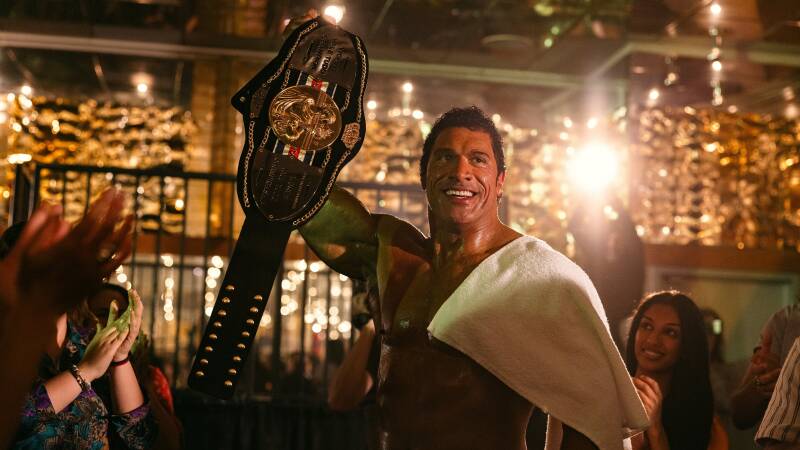
"The Smashing Machine" is one of those films that sneaks up on you—not because of any twist or spectacle, but because it quietly chips away at the version of events you think you’re prepared for. I went in expecting a rough-edged sports biopic and came out with something far stranger and more intimate: a portrait of a man so physically indestructible that every emotional fracture feels louder, heavier, and far more catastrophic.
What shocked me most is that Dwayne Johnson—Dwayne Johnson—is the one carrying that weight. I honestly didn’t think he had this performance in him. For years, he’s been more of a brand than an actor: charming, bankable, relentlessly self-marketed. Here, that persona is stripped back so thoroughly that the absence becomes part of the tragedy. He plays Mark Kerr like someone who doesn’t quite know how to exist when he isn’t being slammed, cheered, or medicated. The vulnerability isn’t performative; it’s baked into the way he looks at the world, the way he hesitates before speaking, the way he seems genuinely intimidated by everything outside of fighting. There’s a lived-in fragility to him, as if all the bravado has finally crumbled and he’s left holding pieces he doesn’t recognise.
Safdie shoots Kerr’s life with a restlessness that feels both documentary and fever dream. Scenes don’t build to neat crescendos—they drift, surge, or collapse depending on Kerr’s state of mind. The fights feel less like events and more like bodily flashbacks: fragmented, ugly, occasionally muted, almost as if the camera is overwhelmed by the violence rather than excited by it. And yet the brutality is never the point. What hits hardest are the quiet moments—the ones where Kerr looks utterly lost in his own home, or sits still for too long, as if motion is the only thing keeping him from disintegrating.
Emily Blunt’s Dawn is crucial to this emotional architecture. Their relationship is the messy heart of the film: a knot of affection, resentment, dependency, desperation, and longing. Their arguments are brutal not because they escalate, but because they’re so recognisable. They sound like the kind of fights born from years of loving someone whose chaos slowly swallows the room. The film doesn’t sensationalise their dynamic; it lets the toxicity evolve softly, almost innocently, until it’s too thick to ignore. Blunt anchors the film in a way that stops Kerr’s turmoil from becoming mythic. She pulls it back down to the ground, reminding us that the most violent damage isn’t always inflicted in the ring.
Still, there’s an intentional elusiveness to Kerr’s story—but not the kind that feels boldly deliberate. It’s as if the film keeps circling several different versions of who Kerr is without ever committing to fully realising any of them. The biographical thread feels only half-formed, the fighting world is sketched rather than explored, and the emotional arc—while powerful—never digs as deep as it could. You sense three narratives moving at once, each compelling in its own right, but none given quite enough room to breathe. I kept wishing the film would either pick one lane and tear into it with absolute conviction, or take the time to let each aspect of Kerr’s life fully blossom. Instead, the fragmentation becomes part of the experience: intriguing, affecting, but undeniably incomplete.
And there’s another interesting tension: the film wants Kerr to be flawed, but sometimes it cushions the blow. He’s portrayed as adrift, overwhelmed, pushed too far, hurting too deeply—and while all of that is true, I occasionally felt the story softening the edges of the damage he caused. He’s not a villain, not even close, but part of his tragedy lies in the ways he contributed to the chaos around him. The film touches this, but not always with the full force it deserves. It’s as if Kerr’s pain is allowed to speak louder than the pain he created, and personally, I feel there should be a deft balance between the two.
But while the film doesn’t capture every facet, what it does explore is executed with brutal honesty. The addiction sequences feel suffocating without falling into melodrama. The romance feels doomed without being romanticised. The loneliness hits quietly, almost stealthily, until you realise it’s the most persistent presence in the film. And the synth-driven score—moody, aching, hovering like a half-remembered dream—binds everything together without overwhelming the performances.
What truly lingers is Johnson’s transformation. Not the prosthetics, not the physical intensity, but the emotional collapse. He plays Kerr like a man whose body has won battles his mind was never built to withstand. His breakdowns are small, almost embarrassed. His tenderness feels accidental. His rage feels like the last language he learned before everything else went silent. I’ve never seen him so controlled, so inward, so utterly stripped of his usual certainty. It’s the kind of role that doesn’t reinvent him—it reveals him, in a way that feels long overdue.
"The Smashing Machine" doesn’t try to be the definitive fighting film, or the ideal true-story drama, or the perfect story of a toxic love. It hovers between genres, between truths, between expectations. And weirdly, that’s why it works. It’s uneven, absolutely. It withholds as much as it reveals. But the emotional resonance lands. It settles in your chest. And for all its imperfections, it leaves you with the unmistakable sense that you’ve witnessed something tender and bruising and strangely humane.
8/10
Add comment
Comments